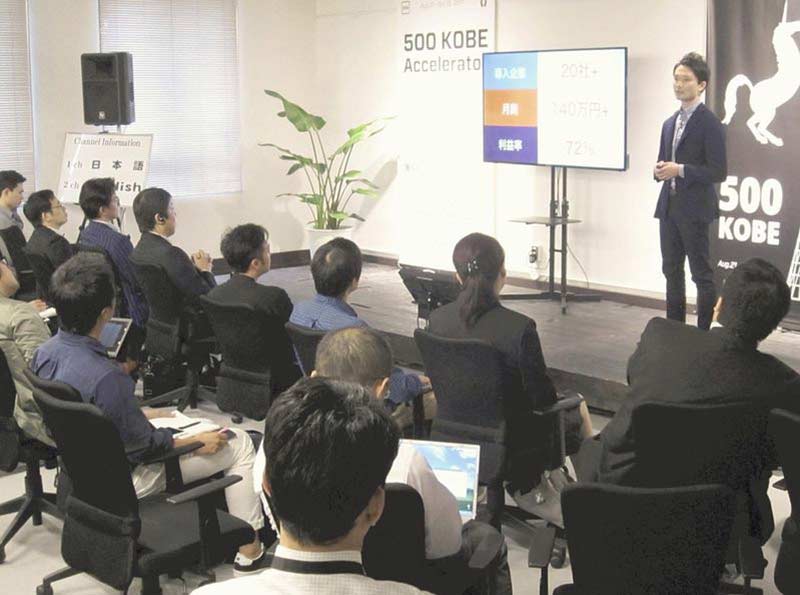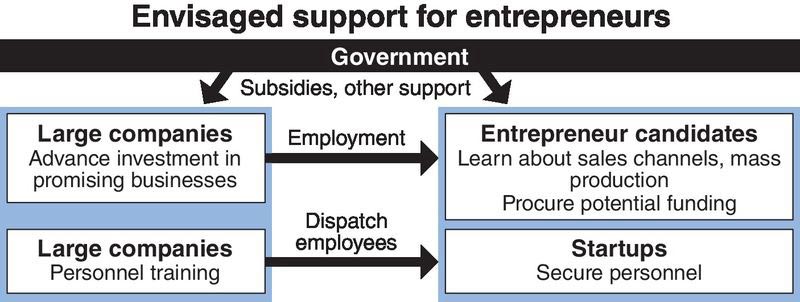
An event to support entrepreneurs is hosted by the Kobe city government in October 2017 in Chuo Ward, Kobe.
November 25, 2021
The government has decided to step up its efforts to foster start-ups and entrepreneurs, especially in the growing field of digital technology.
Starting next year, the government will provide subsidies to large companies that employ future entrepreneurs, and also to start-ups that accept large companies’ workers on loan.
The number of start-ups has rapidly increased in the United States, China and some European countries, and new businesses have driven economic growth in those countries. Japan has lagged behind other nations in the number of its start-ups, leading the government to decide it was necessary to launch new support measures.
The Economy, Trade and Industry Ministry will allocate ¥860 million in its supplementary budget proposal for this fiscal year, ending in March. Prime Minister Fumio Kishida has positioned the fostering of start-ups as one of the pillars of the government’s growth strategy.

According to government sources, the new measures include the introduction of an Entrepreneur-in-Residence (EIR) program, in which young people planning to start their own businesses work at large companies for experience and future funding, and there will also be measures to help start-ups secure personnel.
The EIR program, widely adopted in the United States, is a scheme that allows entrepreneurs in residence to work at companies in businesses close to their own business plans’ target fields. People in the program can learn how to establish sales channels and systems for mass production, among other knowhow. It is also envisioned that the entrepreneurs in residence will possibly get funding from those companies when they launch their own businesses.
The ministry will begin a trial project next year, supporting about 30 to 50 entrepreneurs in residence. Companies that hire them will receive subsidies for necessary expenses.
As many start-ups find it difficult to secure enough personnel, the government will provide about two-thirds of the wages and other burdens that start-ups would have to shoulder when accepting large companies’ workers on loan. On the major companies’ side, it will be beneficial in that their younger workers who are to be in core positions in the future will be afforded rare work experience at start-ups.
According to a U.S. research firm, the number of unlisted start-ups with a corporate value of over $1 billion, or about ¥115 billion — dubbed unicorns — was six in Japan as of September, while the number was 424 in the United States and 165 in China.
Top Articles in Business
-

Prudential Life Insurance Plans to Fully Compensate for Damages Caused by Fraudulent Actions Without Waiting for Third-Party Committee Review
-

Narita Airport, Startup in Japan Demonstrate Machine to Compress Clothes for Tourists to Prevent People from Abandoning Suitcases
-

Japan, U.S. Name 3 Inaugural Investment Projects; Reached Agreement After Considerable Difficulty
-

Toyota Motor Group Firm to Sell Clean Energy Greenhouses for Strawberries
-

SoftBank Launches AI Service for Call Centers That Converts Harsh Customer Voices into Softer Voices
JN ACCESS RANKING
-

Japan PM Takaichi’s Cabinet Resigns en Masse
-

Japan Institute to Use Domestic Commercial Optical Lattice Clock to Set Japan Standard Time
-

Israeli Ambassador to Japan Speaks about Japan’s Role in the Reconstruction of Gaza
-

Man Infected with Measles Reportedly Dined at Restaurant in Tokyo Station
-

Videos Plagiarized, Reposted with False Subtitles Claiming ‘Ryukyu Belongs to China’; Anti-China False Information Also Posted in Japan




















